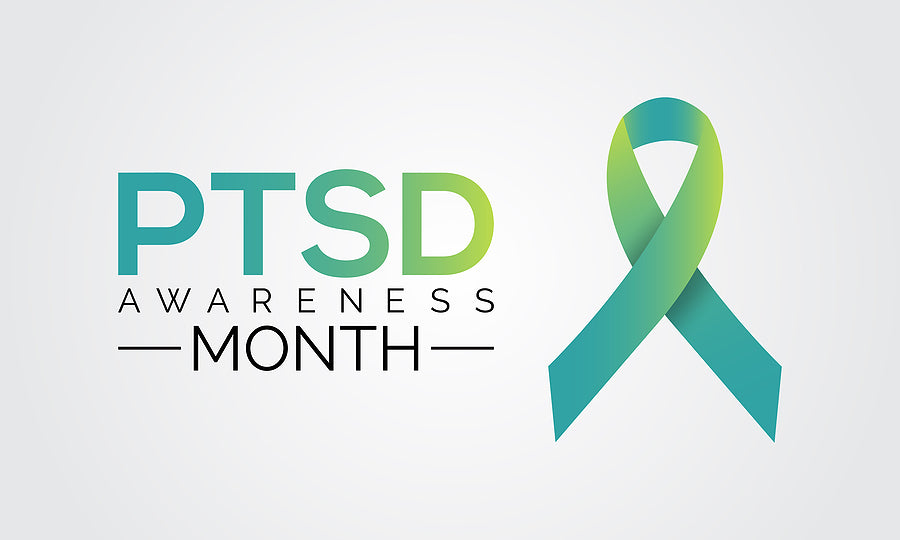June: PTSD Awareness month
Written by Kimberly Meehan, PMHNP
June is Post-Traumatic Stress Disorder (PTSD) awareness month.
Most people hear PTSD and automatically assume it is only for people who have gone through major events like warfare or natural disasters. However, this is one of the biggest misconceptions as PTSD, and trauma in and of itself, can come from many things, both big and small.
Little Trauma vs. Big Trauma
Often I like to ask clients, “Is there anything that you’ve ever experienced that still impacts you today?” This question is getting at the root of any sort of trauma. That continued harassing comments your boss makes? The invalidation from a parent for your entire life? Those may not be one big moment, or a “big T”, but those “little T’s” have a cumulative effect and build up over time to have just as much, if not more of an emotional impact on someone as a big T event.
Big Trauma: Often referred to as "Big T" trauma, these are significant, often life-threatening events that pose a direct threat to one's safety and well-being. Examples include:
- Military combat
- Natural disasters (earthquakes, hurricanes)
- Serious accidents (car crashes)
- Violent assaults (physical or sexual)
- Witnessing death or severe injury
Little Trauma: Also known as "little t" trauma, these experiences might not appear as severe but can still deeply affect an individual over time . These include:
- Emotional abuse or neglect
- Chronic stress (due to workplace harassment, bullying)
- Divorce or significant relationship breakdown
- Financial instability or prolonged unemployment
- Sudden loss of a loved one
- Medical trauma
Both types of trauma are significant and can lead to PTSD, and long lasting impact on an individuals life. Little traumas often accumulate over time, and their impacts may be less immediately obvious compared to big traumas.
Complex PTSD
Complex PTSD is a more recent diagnosis which occurs when someone is exposed to a traumatic event repetitively, hundreds to thousands of times over many years. This could be invalidation from parents, childhood abuse, neglect or abandonment, ongoing domestic violence or witness of it. When you are traumatized that many times, it becomes internalized and often doesn’t look like ‘typical PTSD’ because it becomes the lens of which someone sees and interacts with others and life.
PTSD in Daily Life
PTSD can manifest in various ways, affecting an individual’s day-to-day experience. Some common signs include:
- Intrusive Memories: Flashbacks, nightmares, and intrusive thoughts related to the trauma can disrupt daily activities.
- Avoidance: People may avoid places, people, or activities that remind them of the trauma, leading to social isolation.
- Negative Changes in Thinking and Mood: Feelings of hopelessness, memory problems, and difficulty maintaining close relationships are common.
- Changes in Physical and Emotional Reactions: This includes being easily startled, feeling tense or on edge, and experiencing angry outbursts or severe anxiety.
These symptoms can make ordinary tasks challenging, affecting work, school, and personal relationships. A lot of times, they have what I call interweaving effects… where maybe someone isn’t consciously aware that the trauma is impacting thow they show up in their life, but when processing and linking the emotional experience from one event to another, we see a connection to a deeper feeling that is played out over many years.
Many times we push away these emotions because they are too difficult to cope with. Because humans are so resilient in nature, we develop survival skills so that despite the dysregulated feelings from an event, we can show up. It’s only later that we realize these survival skills (that sometimes manifest as eating disorders, short tempers/anger, dissociation, unhealthy relationship patterns, substance use and alcoholism) are ways that are brains develop to cope with a stressful event and the resulting emotions. While these survival skills served a really important role at one point in time to protect us from difficult emotions, they often no longer serve that same role and can often then interfere with living a meaningful life.
5 Strategies to Help Manage PTSD
- Seek Professional Help: A licensed therapist specializing in trauma can provide evidence-based treatments like Internal Family Systems (IFS) or Eye Movement Desensitization and Reprocessing (EMDR). These therapies help reprocess traumatic memories and reduce their impact.
- Establish a Routine: Creating a structured daily schedule can provide a sense of normalcy and control. Simple routines, like regular meal times, exercise, and sleep schedules, help ground individuals.
- Practice Mindfulness and Relaxation Techniques: Mindfulness meditation, deep breathing exercises, and yoga can reduce stress and improve emotional regulation. These practices help anchor individuals in the present, reducing the power of traumatic memories.
- Build a Support Network: Connecting with supportive friends, family, or joining a support group can provide comfort and understanding. Sharing experiences with others who have faced similar challenges can be particularly healing.
- Healthy Lifestyle Choices: Regular physical activity, a balanced diet, and avoiding alcohol and drugs can improve overall well-being. Exercise, in particular, is known to release endorphins that naturally boost mood.
Understanding PTSD involves recognizing that both little and big traumas can have profound impacts on individuals. Symptoms can disrupt daily life, but with the right strategies and support, those affected can find ways to manage and reduce the disorder's impact. Remember, seeking professional help is a critical step toward healing, and there are various avenues and resources available for those in need. Whether dealing with little traumas or big traumas, acknowledging the issue is the first step toward recovery.
Book Recommendations for PTSD:
1)The Body Keeps the Score by Bessel van der Kolk
2) What My Bones Know by Shirly Foo
3) Happy Days by Gabrielle Bernstein
4) It didn't start with you by Mark Wolynn
5) What Happened to You? By Oprah Winfrey and Bruce Perry
Podcast Recommendations:


